Related Research Articles

The Benelux Union or Benelux is a politico-economic union and formal international intergovernmental cooperation of three neighbouring states in Western Europe: Belgium, the Netherlands, and Luxembourg. The name is a portmanteau formed from joining the first few letters of each country's name and was first used to name the customs agreement that initiated the union. It is now used more generally to refer to the geographic, economic, and cultural grouping of the three countries.

The European Union (EU) is a supranational political and economic union of 27 member states that are located primarily in Europe. The Union has a total area of 4,233,255 km2 (1,634,469 sq mi) and an estimated total population of over 449 million. The EU has often been described as a sui generis political entity combining the characteristics of both a federation and a confederation.

The European Investment Bank (EIB) is the European Union's investment bank and is owned by the 27 member states. It is the largest multilateral financial institution in the world. The EIB finances and invests both through equity and debt solutions companies and projects that achieve the policy aims of the European Union through loans, equity and guarantees.
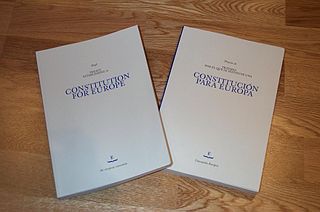
The Treaty establishing a Constitution for Europe was an unratified international treaty intended to create a consolidated constitution for the European Union (EU). It would have replaced the existing European Union treaties with a single text, given legal force to the Charter of Fundamental Rights, and expanded qualified majority voting into policy areas which had previously been decided by unanimity among member states.
European integration is the process of industrial, economic, political, legal, social, and cultural integration of states wholly or partially in Europe, or nearby. European integration has primarily but not exclusively come about through the European Union and its policies.
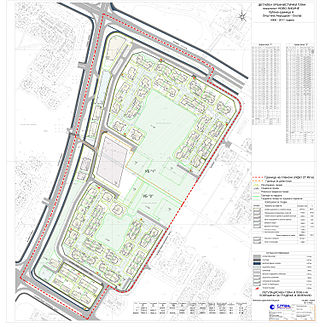
Spatial planning mediates between the respective claims on space of the state, market, and community. In so doing, three different mechanisms of involving stakeholders, integrating sectoral policies and promoting development projects mark the three schools of transformative strategy formulation, innovation action and performance in spatial planning

The Regional Policy of the European Union (EU), also referred as Cohesion Policy, is a policy with the stated aim of improving the economic well-being of regions in the European Union and also to avoid regional disparities. More than one third of the EU's budget is devoted to this policy, which aims to remove economic, social and territorial disparities across the EU, restructure declining industrial areas and diversify rural areas which have declining agriculture. In doing so, EU regional policy is geared towards making regions more competitive, fostering economic growth and creating new jobs. The policy also has a role to play in wider challenges for the future, including climate change, energy supply and globalisation.

The European Structural and Investment Funds are financial tools governed by a common rulebook, set up to implement the regional policy of the European Union, as well as the structural policy pillars of the Common Agricultural Policy and the Common Fisheries Policy. They aim to reduce regional disparities in income, wealth and opportunities. Europe's poorer regions receive most of the support, but all European regions are eligible for funding under the policy's various funds and programmes. The current framework is set for a period of seven years, from 2021 to 2027.
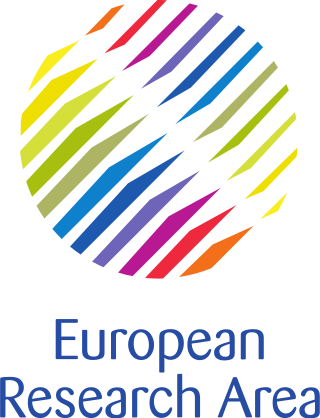
The European Research Area (ERA) is a system of scientific research programs integrating the scientific resources of the European Union (EU). Since its inception in 2000, the structure has been concentrated on European cooperation in the fields of medical, environmental, industrial, and socioeconomic research. The ERA can be likened to a research and innovation equivalent of the European "common market" for goods and services. Its purpose is to increase the competitiveness of European research institutions by bringing them together and encouraging a more inclusive way of work, similar to what already exists among institutions in North America and Japan. Increased mobility of knowledge workers and deepened multilateral cooperation among research institutions among the member states of the European Union are central goals of the ERA.

The European Institute for Gender Equality (EIGE) is the European Union’s agency for gender equality.
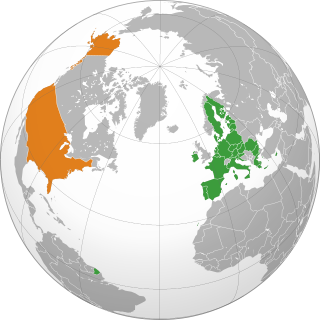
Relations between the European Union and the United States began in 1953, when US diplomats visited the European Coal and Steel Community in addition to the national governments of its six founding countries. The two parties share a good relationship which is strengthened by NATO, cooperation on trade, and shared values.
Interreg is a series of programmes to stimulate cooperation between regions in and out of the European Union (EU), funded by the European Regional Development Fund. The first Interreg started in 1989. Interreg IV covered the period 2007–2013. Interreg V (2014–2020) covers all 27 EU member states, the EFTA countries, six accession countries and 18 neighbouring countries. It has a budget of EUR 10.1 billion, which represents 2.8% of the total of the European Cohesion Policy budget. Since the non EU countries don't pay EU membership fee, they contribute directly to Interreg, not through ERDF.

The energy policy of the European Union focuses on energy security, sustainability, and integrating the energy markets of member states. An increasingly important part of it is climate policy. A key energy policy adopted in 2009 is the 20/20/20 objectives, binding for all EU Member States. The target involved increasing the share of renewable energy in its final energy use to 20%, reduce greenhouse gases by 20% and increase energy efficiency by 20%. After this target was met, new targets for 2030 were set at a 55% reduction of greenhouse gas emissions by 2030 as part of the European Green Deal. After the Russian invasion of Ukraine, the EU's energy policy turned more towards energy security in their REPowerEU policy package, which boosts both renewable deployment and fossil fuel infrastructure for alternative suppliers.

CONCORD, also referred to as CONCORD Europe, is the European confederation of non-governmental organisations working on sustainable development and international development cooperation.
A European grouping of territorial cooperation (EGTC) is a European Union level form of transnational cooperation between countries and local authorities with legal personality. EU Council Regulation 1082/2006 of 5 July 2006 forms its legal basis. As of April 2021, 78 EGTCs are in existence.

The Union for the Mediterranean is an intergovernmental organization of 43 member states from Europe and the Mediterranean Basin: the 27 EU member states and 16 Mediterranean partner countries from North Africa, Western Asia and Southern Europe. It was founded on 13 July 2008 at the Paris Summit for the Mediterranean, with an aim of reinforcing the Euro-Mediterranean Partnership (Euromed) that was set up in 1995 as the Barcelona Process. Its general secretariat is located in Barcelona, Catalonia, Spain.
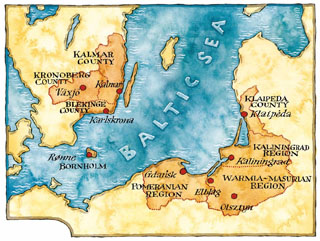
The Euroregion Baltic (ERB) refers to a cross-border Euroregion in the south-east of the Baltic Sea Region, consisting of eight regions of Denmark, Lithuania, Poland, Russia, and Sweden. On 2 March 2022, the ERB's Executive Board suspended Russia's membership, in response to Russia's invasion of Ukraine.

Osservatorio Balcani e Caucaso Transeuropa is a think tank and online newspaper based in Trento, Italy, and specialised on South East Europe.

Victor Negrescu is a Romanian politician of the Social Democratic Party. He is a Member of European Parliament and he was Minister Delegate for European Affairs in the government of Romania between 2017 and 2018. Since 2007, he is the president and national coordinator of the Romanian network of PES activists.
References
- ↑ "EUKN members" . Retrieved 9 January 2024.
- ↑ "European Urban Knowledge Network(EUKN)". Eerste Kamer der Staten Generaal (in Dutch). Retrieved 12 October 2024.
- ↑ "European Urban Knowledge Network (EUKN) | Aarhus Clearinghouse". aarhusclearinghouse.unece.org. Retrieved 12 October 2024.
- ↑ "Support for EU Presidencies" . Retrieved 9 January 2024.
- ↑ "Inforegio - European Urban Knowledge Network (EUKN) becomes the latest EGTC". ec.europa.eu. Retrieved 12 October 2024.